I went for a run this morning, for the first time in almost 12 months. It wasn’t some kind of New Year resolution, honest. It definitely wasn’t.
It’s just that running is kind of my third or fourth choice of exercise regime these days. I’m really a cyclist – that’s where I get 90% or so of my exercise.
And since I’ve just completed a calendar year’s worth of exercise data, let’s make something of it!
Note: Please bear in mind this is all about as scientific and founded in accurate and sound data as, say, your typical front page Daily E*press new medical discovery story…
Here’s my Strava data for 2017:
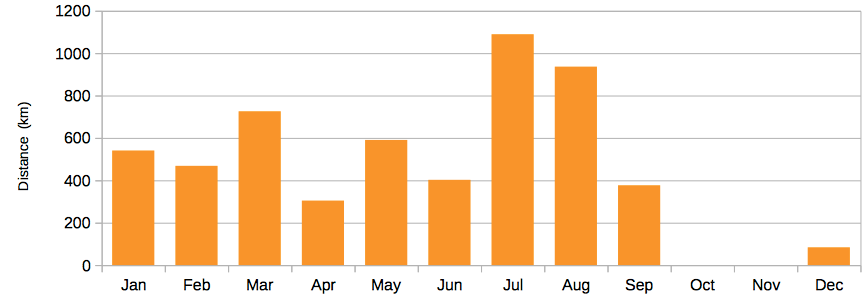
And here’s all my body weight data for the same period, which I’ve recorded (on a fairly regular basis) on Garmin Connect:

The first chart is my own representation of Strava’s data – they show 13 months’ worth of data in the chart on your profile page, which didn’t really fit my narrative. Note that their data also lumps all types of exercise in together, but since cycling accounts for about 95% of my exercise, and covers a lot more distance than any of the other exercise I do, you can fairly closely approximate this as distance cycled.
The second chart is a screen grab from Garmin’s website. The black line is my totally unachievable ideal (for cycling up hills) weight which I’d been wishing for, but totally failing to achieve for a few years now.
1. Weight increases with exercise
So let’s plot the two datasets together (total kilometres versus average recorded weight, per month):
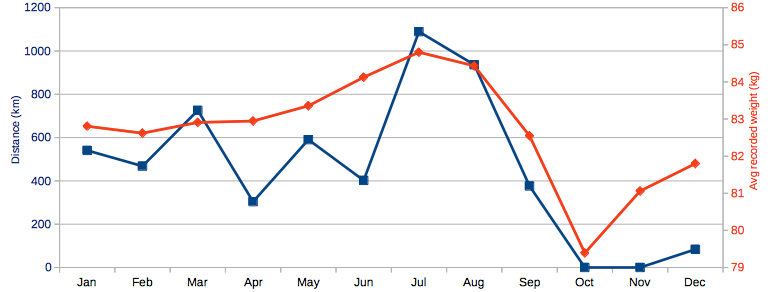
This chart clearly shows that my monthly average recorded weight fluctuates almost totally in line with the distance I cycle – the more I cycle, the heavier I get; and when I stop riding I lose weight even more rapidly.
Small print: But of course that’s not really what’s going on!
What’s actually going on here?
Where are some of the problems with this conclusion? Well firstly there’s the sample size – we’re looking at one person’s data. Never a good start. But since that person is me, I’m in a pretty good position to guide you through some of the problems with this dataset.
The Strava data – this is actually pretty sound and does reflect my exercise levels for the year pretty well.
- I’ve already discussed that it’s not quite a record of totally comparable data – there are a few mountain hikes in there, and a couple of runs (more shenanigans with these later..) but since the overwhelming majority of my aerobic exercise comes from cycling, it’s probably a good approximation to the amount of exercise I get.
The Garmin data, my weight records – this is where most of the problems occur. There’s way too much personal bias going on.
- I don’t record my weight every day. When I do record though, I try to record at approximately the same time of day, and under the same conditions – namely first thing in the morning as soon as I get out of bed – it makes for a nicer (smaller) number, but since it’s consistent that shouldn’t be a problem.
- I log my weight to help me try to keep my weight down. So I tend to actually bother to record more regularly when I know I’m working harder and the weight is likely to be heading downward. Conversely, when I haven’t exercised for a while I tend to get out of the habit with the weight logging as well.
- Sometimes, if I find my recorded weight has increased by a particularly upsetting amount, I accidentally “forget” to record it. I’d eaten an especially big curry or something, so it shouldn’t count anyway! (Except for that spike at the start of July, where I had a couple of big celebration meals on subsequent days, and proudly recorded it anyway)
But there’s still that big dive in both datasets in September and October. What happened there? I stopped exercising altogether and also lost more than 5 kilos in weight, surely there’s some connection?
There is! I fell off my bike. Specifically, I fell off my mountain bike on to my face, broke my upper jaw and fractured my eye socket.
Here’s the Strava ride profile for that fateful trip:

Which looks almost exactly the same shape as ever other chart I’ve shown you so far. And that’s definitely a coincidence!
I spent five nights in hospital, 4 of the them on a nil-by-mouth overnight regime while they tried to find a slot to operate, and eating pureed and/or liquidised food in between. Coupled with my body spending most of its energy trying to repair all the breaks and bruises, the dramatic weight loss is totally explainable.
Cause and effect: I then had to put my feet up for 7 weeks while the bones reset. By which time nights had got dark early, and colder and wetter, and – did I forget to mention this? – since most of my cycling miles come from commuting anyway, I kind of couldn’t be bothered to get back on my bike.
You’ll also see that by mid-November my weight had started to return to “normal” and I stopped recording it for the rest of the year – more bias: why record my weight when I know it’s going up?
So the average weight for December is actually totally fake data. There weren’t any recordings taken. I only put that in to mimic Garmin’s own chart, which simply extends a flat line from the most recent recording until the end of the year.
So in conclusion – you won’t lose weight dramatically by stopping exercising, unless by stopping exercise you actually mean stopping by smashing your face in to the ground at [this is rather embarrassing – Strava recorded the moment of my crash, and I was going at a particularly reckless and dangerous speed of] 10.3 miles per hour.
Back to this morning’s run:
2. If you don’t run for a year, then eat lots of crap food and drink lots of alcohol for a couple of weeks and go for a run – you’ll run quicker
So before this run, my most recent running outing was back in January 2017. That time I was pretty fit, having not just taken 3 months off from exercise, and was being pushed hard on a group run. That time I set a PB, according to Strava (natch), for 5km which was just over 28 minutes. Not bad for a non-runner like me.
Anyways, this morning I got a mile in to the run (almost one third of 5km) and my computer was telling me I;d only taken 7 mins 24 seconds.
A quick bit of mental arithmetic told me I was going to smash my 5km PB by about 20%, with a spectacular new time of around 23 minutes if I kept up this pace. I was going great!
I still felt good, but as the run continued my times dropped away quite dramatically. Here are the mile splits from Strava:
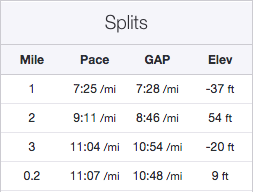
~7 minutes, then ~9 minutes, and then ~11 minutes. Hmmm…
And here, rather tellingly is the GPS blip which added about 500m to my recorded distance for no reason:
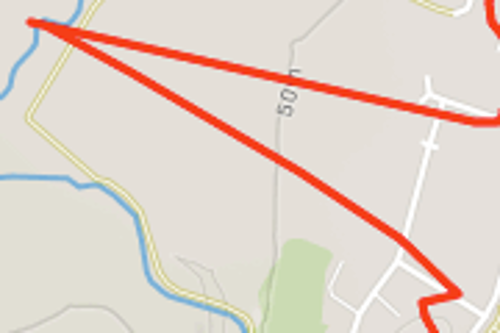
The moral of this story is – never trust totally unbelievable and spuriously collected and thoroughly and misleadingly misinterpreted data. Nor for that matter outrageous newspaper headlines which might be based on it…
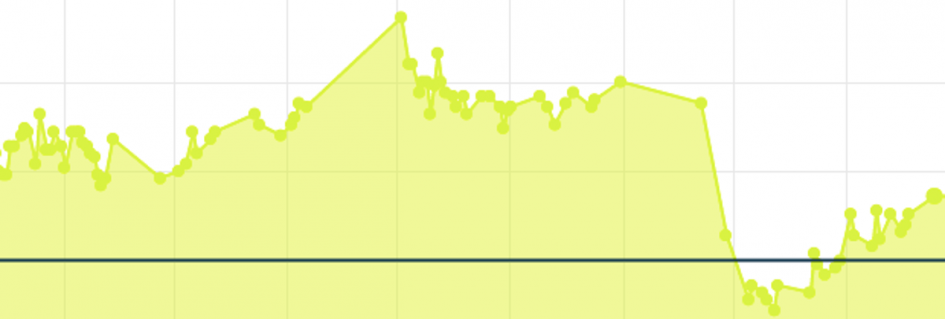
Leave a Reply